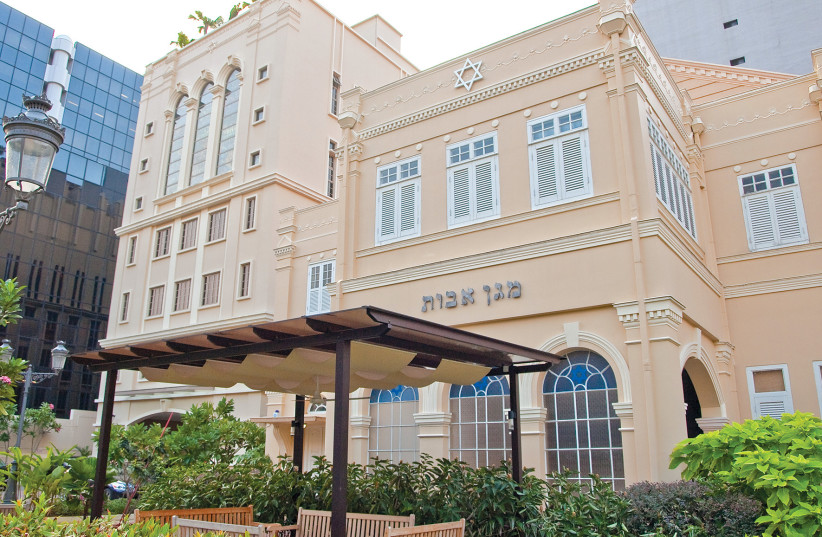On October 4, just days before the terrorist attack on Israel on October 7, I attended a Sukkot celebration at the Magen Avoth Synagogue on Waterloo Street, the oldest existing synagogue in Singapore, dating from 1878. Goh Chok Tong, former prime minister of Singapore and patron of the Inter-Religious Organization (IRO), was the guest of honor.
The celebration was attended not just by the rabbi but also by the Mufti of Singapore and religious leaders of all faiths – Buddhist, Taoist, Hindu, Sikh, Christians of different denominations, Zoroastrians and Bahai – from the IRO.
This interfaith event was unique. Such an event would not – could not – have been held anywhere else in Southeast Asia. I doubt that anything like it was likely to be held anywhere else in the world.
This is what makes Singapore Singapore. Whatever our individual opinions about October 7 and its aftermath, respect for other religions is something precious to be preserved at all costs. But defense of our uniqueness from the raw emotions evoked by the war in Gaza also requires a deeper understanding than can be conveyed by any speech or article.

Principles are necessarily simplifications of far more complex, and at times harsh, realities. No government, out of diplomatic prudence if nothing else, can publicly say everything that needs to be said about balancing conflicting considerations and the complicated processes in which principles must be contextualized in order to become policy.
Singaporeans should not dismiss the depth of the trauma inflicted by the barbarism of the October 7 attack: not just murder, but rape, torture, mutilation, including of infants, in some instances captured on videos by cameras of killed terrorists. This cannot be justified by any reason.
Documents captured from dead terrorists make clear that their orders were to kill as many people as possible and not any military objective. Israel is a small country, and few Israelis would be at more than one degree of separation from those murdered or taken hostage.
Justified anger at atrocities does not, of course, justify committing atrocities in turn. The ministerial speech cautioned that “it is crucial that decisions are not made out of anger, blind wrath, and hatred.” That is obvious, and I don’t think the Israeli government will do so, even if some Israeli political figures speak wildly and thoughtlessly. But it is equally crucial that Singaporeans understand Israel’s war aims.
This is certainly not a war of revenge. To say that Israel is exercising its inherent right to self-defense, while true and important, begs the really crucial question: To what specific end is Israel exercising that right?
The answer is to restore deterrence. The importance of this cannot be over-emphasized.
The importance of Israel's efforts to restore deterrence against Hamas
On October 7, Israeli deterrence against Hamas clearly failed. Israel must restore deterrence against Hamas and whatever may replace it in Gaza after its current leadership is destroyed. More vitally, Israel must restore deterrence against Iran and Hezbollah and other terrorist groups that Tehran supports.
Restoring deterrence is an existential issue for Israel. Deterrence based on military superiority is one of the pillars on which Israel’s right to exist has rested from its very foundation.
The Abraham Accords are, in effect, a US-sponsored anti-Iran coalition in which Israel provides military heft and the US overall deterrence against Iran as off-shore balancer, seen most recently in the deployment of two US aircraft carriers and a nuclear submarine to the region. Since the geopolitical conditions that led to the Abraham Accords have not changed, sooner or later the process of Saudi-Israel normalization will resume, delayed but not diverted by October 7.
Hamas is an offshoot of the Egyptian Muslim Brotherhood, which is anathema to Saudi Arabia, the UAE, and most Gulf monarchies and the Egyptian military. I doubt that anyone in Riyadh, Abu Dhabi, or Cairo is losing much sleep over the eradication of the Hamas leadership. No country has left the Abraham Accord over Gaza. The civilian casualties are mainly a domestic political problem that these governments must manage, and their statements and positions in the UN should be seen in this light.
At the time of writing, it does not seem likely that the current conflict in Gaza will escalate into a wider regional war. Exchanges of fire between Hezbollah and Israel on the northern front have caused relatively few casualties on both sides, and Hezbollah seems more interested in showing solidarity with Hamas than providing real support. Iran has enough internal troubles not to want to add to them by provoking a major war in which it cannot remain uninvolved. I am convinced that sooner or later, there will be a major war in the Middle East. But that big war will be fought over Iran’s nuclear capability, not Palestine, which is simply not important enough to any of the major players. ■
Bilahari Kausikan is a retired senior Singapore diplomat. This essay is excerpted from a longer op-ed in the Straits Times.
